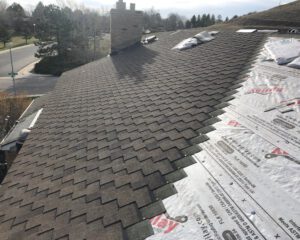Residential Roofers install and repair home roofs. They work in crews that can tear down an old roof and replace it with a new one in a day.

They can also recommend roofing materials based on the weather conditions and other issues in your area. That means they’re more likely to suggest climate-suited products that won’t leak or become saggy in the rain.
Residential roofers typically work with residential clients to install, repair and maintain their homes’ roofing systems. They may also work on commercial properties, such as apartment buildings and shopping malls. In addition to building and repairing roofs, they may also handle the installation of insulation systems and vapor barriers.
The requirements for becoming a residential roofer vary by state, although many require licensing or a specific set of qualifications. To get a roofer license, you’ll need to show two years of experience and pass an exam. In some states, you’ll need to pass a separate business and law exam in addition to the roofing exam.
You need a specialty trade license from the Department of Professional and Occupational Regulation to be a roofer. You must show two years of roofing experience to get a Class C license, three years of roofing experience to get a Class B license and five years of experience to get a Class A license.
Licensing requirements for roofing contractors vary by location and type of project. Most contractors do not need a license, but you must have one to work with asbestos, which can cause serious health problems such as lung cancer and mesothelioma. In addition, you must have a home improvement license to perform work on an existing structure, such as a home or an office.
Depending on your area of the country, you can also get roofing licenses at the municipal level. Check your local government’s website to see if any special requirements are in place.
Some residential roofers decide to move into the commercial market, allowing them to expand their customer base. While the transition can be difficult, it’s an exciting opportunity to gain new business and grow your company.
To ensure your roofing business runs smoothly, it’s important to have a strong foundation in construction, safety and customer service skills. Invest in training, whether through online or in-person programs, so you can provide quality service to your customers.
Keeping up to date with the latest trends in the roofing industry can help you stand out from competitors and attract new clients. For example, green roofs are becoming increasingly popular. These types of roofs can help businesses reduce their environmental impact and improve the energy efficiency of their buildings. Become certified in green roof installation, and you can boost your company’s reputation as an expert in this field.
Residential roofers install, repair, or maintain roofing systems for homes and businesses. They may work independently or as an employee for a construction company. These professionals typically receive training on how to use specific tools and materials.
Generally, the job duties of a residential roofer include inspecting the condition of a roof and identifying any potential problems. They also provide advice on how to keep the roof in good condition.
They may also recommend changes to the layout of the roof to improve its safety and appearance. A skilled residential roofer can spot underlying issues that might be overlooked, which could save the homeowner money in the long run.
In addition, residential roofers perform inspections of buildings and homes before they start a construction project. This helps them determine whether the roof is safe to work on and if there are any underlying issues that need addressing before they become costly and unsafe.
A job as a residential roofer can be very physically demanding. It requires routine and balance, as well as strength to handle heavy tiles throughout a day. This can be difficult and exhausting, especially for those who have poor health or are older.
It is possible to earn a decent income as a residential roofer. According to the Bureau of Labor Statistics, the median annual wage was $42,100 in 2019. This is higher than many other occupations.
Most roofers work full time. Their hours vary by season, due to weather conditions. In winter, roofers tend to have shorter working hours, while in summer they may work longer hours.